Oregon Consumer Privacy Act: An Overview of OCPA
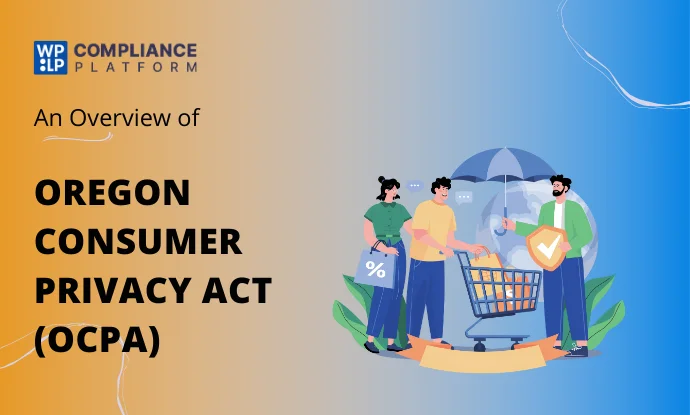
There are many privacy laws to be aware of, but where does the Oregon Consumer Privacy Act (OCPA) fit in with respect to similar laws?
With the increase in personal data security issues, it is imperative for both entities and individuals to understand the ramifications of this important Oregon privacy law. Although the digital era has provided a wealth of opportunity for businesses and consumers alike, it has also raised a chock-full of data security issues.
The various states have difficulty examining their growing issues within the United States, which has resulted in some states passing laws. The Oregon Consumer Privacy Act has emerged as a comprehensive platform to protect personal data for residents living in Oregon and addresses a clear framework of obligations on businesses.
This guide explains the Oregon Protection Act, what it requires, and how it impacts and relates to Oregon residents and businesses.
Whether you are a business finding a pathway to know how to comply, or if you are an Oregonian resident wondering about your privacy rights, this guide will provide you with a comprehensive overview for navigating this historic piece of legislation.
- What is the Oregon Consumer Privacy Act?
- To Whom Does the Oregon Privacy Law Apply?
- What Does the Oregon Consumer Privacy Act Include?
- Who Needs to Comply With The Oregon OCPA Law
- How Businesses Can Comply with the Oregon Protection Act?
- Consequences and Penalties for Non-Compliance with Oregon Consumer Privacy Act
- Frequently Asked Questions
- Conclusion
What is the Oregon Consumer Privacy Act?
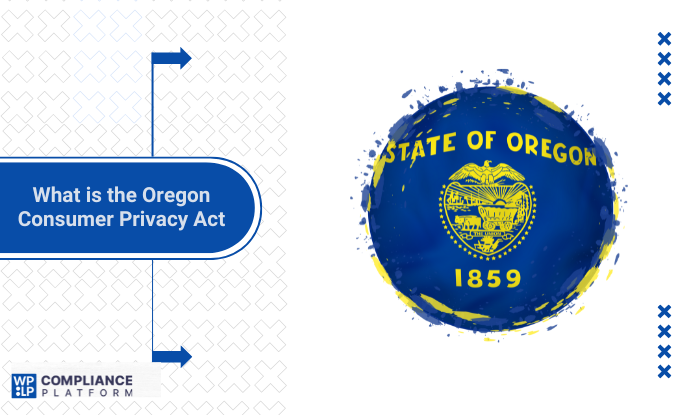
The Oregon Consumer Privacy Act is a state law regulation of data protection to allow Oregon residents greater control over their data.
After lawmakers passed the OCPA in 2023 the bill went into effect on July 1, 2024. The OCPA generally follows the framework of other state privacy acts, particularly the California Consumer Privacy Act (CCPA) in California, and GDPR. However, the Oregon law contains a number of distinctive provisions.
The OCPA creates obligations for businesses about gathering, storing, and processing a user’s personal data.
The OCPA, like other consumer/developer privacy acts, emphasizes transparency in what businesses do with user data, and how consumers also understand how their personal data is utilized, support consumer rights regarding usage, and empowers consumers to know, access, delete and edit their information when necessary.
Some highlights of the OCPA are:
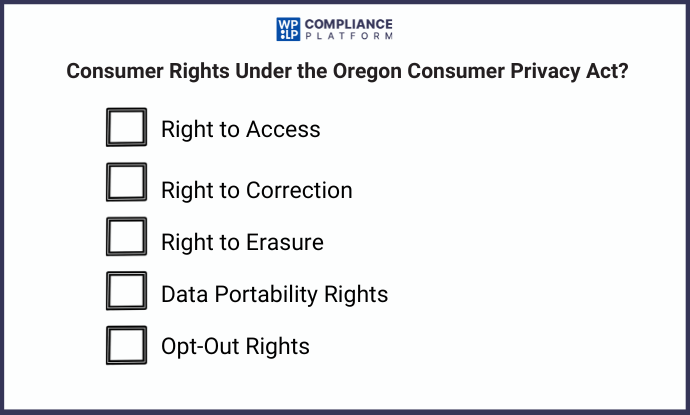
- Right to Access: Consumers can submit a request to know what personal data a business has collected about them.
- Right to Correction: If the information that is collected on you is inaccurate, you may submit a correction request.
- Right to Erasure: Consumers may request that a business delete their information.
- Data Portability Rights: Consumers have the right to request that their data be portable in order to transfer it to an alternate service provider.
- Opt-Out Rights: Consumers have the right to opt out of advertising targeting, the sale of personal data, or profiling practices used for significant decisions.
To Whom Does the Oregon Privacy Law Apply?
The Oregon Consumer Privacy Act mainly applies to Oregon-based businesses or those businesses that target Oregon residents. However, not all businesses are under the ambit of the Oregon Privacy Act. The Oregon privacy law sets specific thresholds for determining applicability. Businesses fall under the OCPA based on one of the following criteria:
- Revenue-Based Criterion: The business earns more than $25 million in annual revenue.
- Data-Volume Criterion: The business deals with the personal data of at least 100,000 consumers annually.
- Data Sales Revenue: The company generates at least 25% of its overall revenue from the sale of personal data while processing data from at least 25,000 consumers on an annual basis.
Exemptions apply to non-profit organizations, government agencies, and businesses whose employee data are being processed or organizations whose data processing falls within specific exceptions.
What Does the Oregon Consumer Privacy Act Include?
Under OCPA definitions that strive to avoid ambiguity in their sweeping breadth of data privacy practices lie:
1. Definitions of Personal Data
Personal data refers to any information that, either directly or indirectly, links or may reasonably be linked to an individual’s identity. Nonetheless, the Oregon Protection Act excludes deidentified or publicly available data.
2. Requirements for Data Transparency
Under the Oregon Consumer Privacy Act (OCPA), transparency underpins this legislation by bringing on board businesses that will clearly detail how they collect, use, and protect personal data. Once again, it obliges these businesses to ensure that they have accessible and informative privacy notices for consumers.
The privacy notices shall contain the following detailed elements:
- Categories of Personal Data Collected: Companies should decide what type of personal data they are collecting from consumers ranging from simple identifiers such as a name/mailing address and/or email address, to a wider range of sensitive information, such as location information, purchase history, or other information that can be linked to the individual and/or household.
- Purposes for Data Collection: All companies are required to explain what they are amassing data for. The businesses’ purpose can vary from enhancing the customer experience, providing targeted advertisements, or fulfilling its obligations to laws – there should be clarity of purpose. Transparency helps consumers understand their choices when they engage with a particular business.
- Consumer Rights: There should be clarity of the rights afforded to consumers under OCPA in their privacy notice. For example, the ability to access their rights, correct an inaccuracy, delete any personal information and/or direct a request not to sell their data or targeted advertisement.
- Contact Information for Questions or Requests: Companies should have clear contact information (e.g. an email address) when dealing with requests related to privacy when responding to consumer concerns or requests. Businesses should designate the person in which the request will be handled.
By adhering to these transparency obligations, companies will comply with the OCPA, but simultaneously enhance the personal relationship that they have with their consumers by showing accountability
3. Data Minimization Principles
The Oregon Consumer Privacy Act (OCPA) law requires businesses to collect only such data that are required for clearly formulated specific purposes. Businesses cannot collect more or irrelevant data.
Organizations need to ensure that personal data is protected by reasonable security measures against unauthorized or unlawful processing and accidental loss, destruction, or damage.
4. Security Requirements
Businesses that have reached or exceeded the thresholds listed must comply with OCPA. Industries affected by the Oregon Consumer Privacy Act include eCommerce companies, tech companies, healthcare organizations, and retail companies.
The law also includes organizations that engage in specific advertising practices or use algorithms to make decisions. Non-compliance has serious financial and reputational implications and may necessitate business owners to take proactive steps in meeting requirements for compliance with the Oregon Protection Act.
Who Needs to Comply With The Oregon OCPA Law
The Oregon Consumer Privacy Act (OCPA) covers a very large category of businesses; therefore, it requires a huge expansion and attention. Any business, irrespective of its location, must comply with the OCPA.
Businesses are covered only if they cross certain thresholds: for instance, based on numbers of Oregon resident’s data processed or revenues from the sale of personal data. This would ensure that business organizations processing significant numbers of Oregon residents’ data fall within the ambit of this Oregon privacy law.
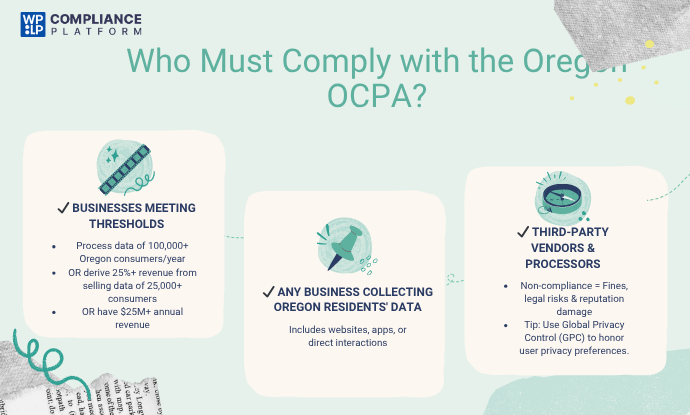
Residents of Oregon
Collects or Processes Personal Information Any business that collects personal information of residents of Oregon is required to adhere to the OCPA regulations. The collection or processing of the data is directly or indirectly done through different means, such as websites, mobile applications, or direct connections with customers.
Uses Personal Data for Targeted Advertising or Profiling
Organizations that use personal data for behavioral advertising, personalized marketing campaigns, or automated profiling are required to meet the standards of OCPA. This provision highlights the interest of the Oregon privacy law in protecting data subjects from intrusive and exploitative data practices.
Engages Third-Party Vendors or Processors
Organizations are responsible for ensuring their data processors and third-party vendors comply with the requirements of OCPA. This has a ripple effect, holding everyone involved in the processing accountable for meeting privacy compliance, which can be easier with data processing agreements.
Compliance with Oregon Consumer Privacy Act is not a choice for businesses that qualify. In fact, not complying brings penalties, legal challenges, and damage to the reputation of organizations, thus making it a matter of grave importance and business.
The Global Privacy Control (GPC) may be a necessary compliance tool under the Oregon Consumer Privacy Act, because it would allow consumers to talk directly to the web sites or businesses through the mechanism of privacy preferences.
How Businesses Can Comply with the Oregon Protection Act?
Compliance with the Oregon Consumer Privacy Act (OCPA) shall have the following form: policies, technologies, and employee training. Here are the steps:
1. Data audit:- Chart out collected/processed personal data and determine the purpose and legal grounds for data collection.
2. Upgrade your privacy policies:- Privacy notices should include OCPA requirements such as consumer rights and how to exercise them to avoid data privacy issues.
3. Accommodate Consumer Rights Requests:- Implement processes for consumer request handling, such as access to data or deletion, within a specified time.
4. Strengthen Data Protection Controls:- Install secure encryption, robust multi-factor authentication, and regular security audits.
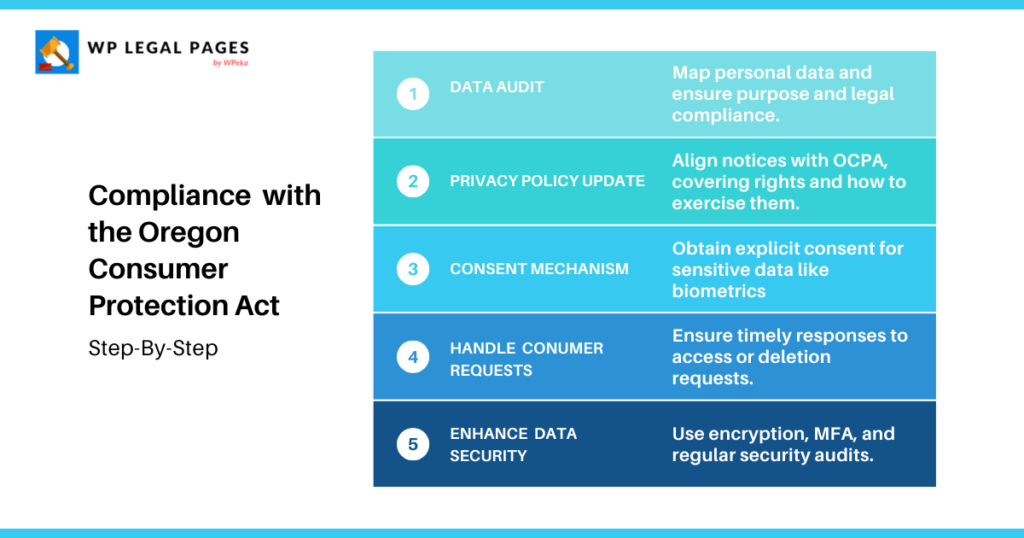
Consequences and Penalties for Non-Compliance with Oregon Consumer Privacy Act
Failure to comply with the Oregon Consumer Privacy Act (OCPA) attracts substantial penalties. In terms of the enforcement, the Oregon Attorney General is in charge, and various infractions attract:
- Civil Fines: Fines of up to $7,500 per violation.
- Consumer Losses: Individuals may pursue these through private action under limited circumstances. When notified, businesses have thirty days to fix violations, but if they fail to do so, individuals can file the violations with the court.
Use the WP Legal Pages plugin to generate a privacy policy for your website that aligns with the OCPA. Clearly state what types of personal data you collect, how you process them, and what rights users have under the OCPA—such as accessing, deleting, or correcting their personal information.
Besides this, use the WP Cookie Consent plugin and provide options for the discussion of data collection by cookie consent, while being transparent, thus ensuring compliance with the OCPA’s transparency and opt-out requirements.
Frequently Asked Questions
The OCPA would take effect on July 1, 2024, in Oregon, but the rules specifically directed at nonprofit organizations would come into effect until July 1, 2025. The mandate for entities to respect opt out signals would be enforceable from January 1, 2026, onwards.
Only business operations that meet certain thresholds—such as processing information of over 100,000 customers in a year or earning more than $25 million annually—fall under the law’s coverage.
Oregon Privacy law, like many state data protection laws, does not grant a private right of action. This means individual consumers cannot sue organizations for violating their rights under the Oregon Protection Act.
The Oregon Consumer Privacy Act applies almost universally to nonprofits, but nonprofits with an expressed mission that falls within the category of detecting and preventing fraud in insurance, radio/television programming, and other non-commercial activities are exempt.
Conclusion
The Oregon Consumer Privacy Act is more than just another privacy law on the state level; it itself represents a forward-looking approach toward the protection of data.
By placing the rights of Oregon residents paramount, but outlining clear business responsibilities as well, OCPA strengthens the foundations of trust in the digital economy further.
The Oregon Privacy law is a threat to companies but also an opportunity.By demonstrating transparency and responsible data use, your business reduces the likelihood of fines and builds stronger consumer relationships through OCPA compliance.
Therefore, companies should take steps now to review their entities’ data policies, update where necessary, and train employees on compliance strategies before the July 2024 enforcement deadline.
Finally, the Oregon Consumer Privacy Act is a precedent that only adjusts innovation with privacy. For those who care for its standpoints, it offers a road map for living in an era that treats data privacy laws above everything else.
If you liked this article, you can also consider reading:
- How to Become Compliant with the California Consumer Privacy Act (CCPA)?
- General Data Protection Regulation (GDPR) Compliance?
- What is the General Data Protection Law (GDPL)?
Want to ensure your website complies with OCPA? Grab WP Legal Pages Compliance Platform now!
